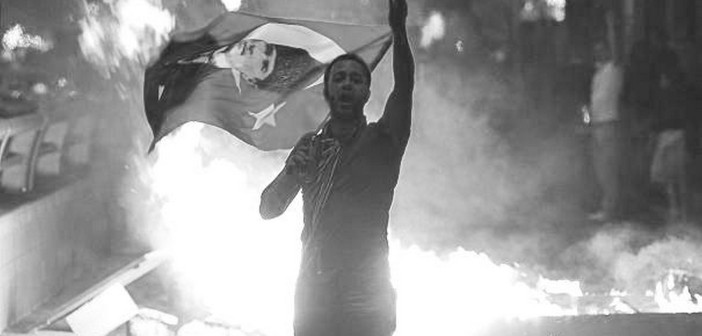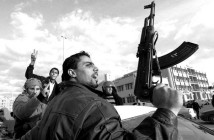As the Ottoman Empire crumbled, Turkey became a modern nation after an anti-imperialist struggle against occupations of several European armies andmoved in the direction of secularism. Turkey is one of the most progressed nations in the Muslim worldduring the early twentieth century.
Nowadays negotiations with the European Union are stagnating and the Turkish nation seems to be on a quest for its identity in the twenty first century. A potential big player and key nation in the Muslim world, Turkey’s global role is still largely undefined. As well as being a bridge between two continents, Turkey is a bridge between two cultures – the Near and Middle East and Europe and the Western World.
Dr. KubilayAkman teaches Sociology at the Bingöl University in Eastern Anatolia. He has expert knowledge onSufism, as well as the sociology of art. Recently he wrote a paper, analysing the representation of the “Arab Spring” in the media and looking at its simulative identities. We thank Dr. Akman for discussing with us the Turkish current affairs from a sociologist’s point of view.
The Maghreb and Orient Courier – Dr.Akman, in your opinion, what political future awaits Turkey?
Dr. Kubilay AKMAN – Regarding the political future of Turkey, there is sufficient evidence to be optimistic. The political reformation and democratization of the country on a large scale continues in a decisive route. In the last decade the country has had an incredible change towards freedoms and human rights for everybody, regardless of religious or political identity, ethnicity, etc., comparedto previous periods of the Republic’s history. Let us make a comparison: between 1980-2003, 37 political parties were closed; since 2003 the number is just one. This comparison is only a sample perfectly representing the change in Turkey. We can give examples in many other fields (press, education, gender issues, etc.) These reforms cannot be ignored, the change of the political atmosphere is very clear and hopefully will continue in the future.
MOC –How is it possible that RecepTayyipErdogan won the elections, although he suffered from so many corruption scandals? Is Turkey a democratic state?
Dr. K. AKMAN –There are several reasons to explain the success of Chairman RecepTayyipErdogan: first of all, AK Party is very successful in municipalities. The last victory wasin the local elections of the 30th of March 2014.The majority of the Turkish society trusts the vision and abilities of Prime Minister RecepTayyipErdogan and the AK Party’s municipal activities. Erdogan was a successful Mayor of Istanbul in the 90s and his brilliant skills for local administration are appreciated by a variety of citizens from the left to the right of the political spectrum. There is a common conception that: “The AK Party knows how to deal with issues related to municipalities”. This is the first reason of this victory.
As for so called “scandals” and “corruption”, it is just a claim and there is no proof against either the Prime Minister or his family.
What happened on the 17th of December 2013, has been considered as an operation against democracy and legitimate government, planned and applied by an organization called “parallel state”. This is perceived as being part of a series of operations, including the Gezi Protests in Istanbul, the Egyptian military coup and the tumble of the legitimate government of President Mohamed Morsi and the Ukraine protests. The 17th of December Operation was part ofa scenario, which had some other components before and after. Sure, Turkey is a democratic country as much as is your country and any other European country.
Democracy does not mean that all crises are solved automatically; rather, it means that people and political subjects, including all citizens have substantial channels to express themselves, represent and race democratically for national government and local administrations. These are guaranteed by the constitution, law and related regulations in Turkey. If you can read Turkish newspapers, watch Turkish TV you would see that there ismuch critique in Turkey against the Prime Minister and his Government. If we were an “undemocratic” country, how would it be possible?
The significant support of citizens (45.6%) ofChairman RecepTayyipErdogan and the AK Party on the 30th of March has shown that the people of Turkey, with a variety of ethnicity (Turkish, Kurdish, Zaza, Arabic, Circassian, Laz, etc.) expect the progress of the country not to be interrupted, neither economically, nor politically.
If there were a real scandal or proof of corruption, this victory would not have happened. People have been seriously bothered about the intervention of a blurry, obscure organization into the politics via some dark operations. It was a very clear warning to them.
MOC – Does Turkey have the risk of becoming an Islamic Republic or will the secular spirit remain?
If Turkey has (actually I believe it has) a spirit, it is a mystical spirit coming from the Islamic traditions. Let us have a look at India, Tibet or any other Asian culture. When we talk about their spirit we mention Buddhism, Hinduism or Taoism; rather than their secular social practices.
So, the spirit of Turkey is based on Islamic values for centuries. We are the country of MawlanaJalaladdin Rumi, YunusEmpre, al-Hajj BaktashWali and so on. Turkey is the land of Whirling Dervishes and Sufi Music, literature, etc. So, not only during the Ottoman Empire, but also in the Republican period this mystical inheritance has kept living and will hopefully survive forever as a part of the universal treasures of humanity.
As for the secularism issue, that is the topic of a long discussion not easy to cover here with all its aspects. Well, there is no serious political demand in Turkey towards an Islamic state. The AK Party and all other major parties in Turkey have a consensusabout democracy in our country. The expectation of people to be respected in a democratic state regardless of their beliefs – that is all.
Democracy is the main basis for any political movement in Turkey, which has a significant public support.
MOC – Considering the developments of real estate in Istanbul – does the growth of the city have an impact on Turkish identity? Does it contribute to a more open-minded, westerly oriented Turkish people?
Dr. K. AKMAN –People in metropolitan areas are always more diverse and open-minded. Actually, Istanbul is somewhere about an identity beyond “Turkish”; in Turkish language we can say “Türkiyeli” which means “from Turkey” and may cover all colours of the country. Something like “Turkeyian” or “Turkeyan”. Unfortunately in English there is no equal word.
MOC – Are the Turkish people still westerly oriented (e.g. EU)? It seems that Turkish people, in general, are very nationalist and do not feel as Europeans …
Dr. K. AKMAN –Perhaps the best description of the current position of Turkey may be defined as getting adapted to the global system, with local values and traditions. Honestly speaking, maybe Turkey is more sincere about the EU than some members of the Union. Nationalism in Turkey is represented by MHP (Nationalist Movement Party) and their percentage in the last election is only 15.2%. The rest of the people are not inclined towards nationalism. However, there is a general pride in the country about national heritage and civilization, which is understandable. The actual position of Turkey can be considered as “a critique of Euro-centrism”, without getting disconnected from Europe.
MOC – Considering the issues of Internet control by the Erdogan government, how does that position Turkey? In the EU such control would be unthinkable, on the other hand it is common practice in Iran and Syria…
Dr. K. AKMAN –There are legal regulations about Internet in every country. There are some particular “keywords” you can use in European countries and see how the public prosecution begins. Internet freedom does not give the right of committing crime in any country. Please check the Internet laws of European countries or the US to see how serious regulations and limitations are there.
MOC – What do you think about Turkish positions on Syria? Considering the shooting down of fighter jets on both sides?
Dr. K. AKMAN –The common position of Turkey with the majority of people about Syria is that: “stop violence, conflict and give more freedom, democracy to Syrian people to express themselves”. Turkey has had a “zero problem” policy with its neighbours. The tension there has no advantage or benefit for us.
MOC – Considering the protests and popular unrest across Turkey, following the violent government action to crush opposition to a construction project on the site of the ‘GeziPark’(close to the ‘Taksim Square’ in Istanbul), is Turkey still democratic? Do people still have power to oppose government?
Dr. K. AKMAN –Yes, of course people have power and right to oppose government. If you just go to a bookstore in Istanbul, you will find plenty of publications, photo-albums, magazines, even souvenirs of theGezi Protests.
If it were an undemocratic country, this would not be possible. However, you should keep in mind that any modern state would control the protests in the same manner.
MOC – What about opposition movement to the government in Turkey?
Dr. K. AKMAN –The opposition movement has seen that they do not have a substantial public basis for their actions.
If there is a positive opposition in Turkey, everybody would benefit from this, including the Government. The problem is that, the left (ie CHP, Republican People’s Party) is not really left, the “Islamists” (Saadet Party) are not really Islamist, only the nationalists are really nationalists (MHP).
So, who will be the alternative voice of opposition? An opposition with creative vision and consistent political identity would be really beneficial for Turkey.
MOC – TheGülen (or ‘Hizmet’ or ‘Cemaat’) movement is sometimes described as trying to create a state within a state, by sponsoring new schools, health institutions, infrastructure and media. It seems to represent pacifist, modern Islam. Does it pose a political threat or a viable alternative to the Erdogan government?
Dr. K. AKMAN –After the election they have lost their influence on public opinion. Historically they are coming from Risale-iNurHizmet (the movement founded by Bediuzzaman Said Nursi) but almost all of Risale-iNur Communities have accused, blamed and excluded them severely. The Gülen Organization is not so popular amongst the majority of people in Turkey nowadays. In the last election, they were “the biggest” supporter of CHP, which had serious contradictions to Risale-iNur Movement in the past. Leftist / secularist supporters of CHP have lost their trust to the party because of this obscure “alliance”.
MOC – What about Turkish opinions on Cypriot reunification? Do you see chances of a successful negotiation?
Dr. K. AKMAN –The Cyprus issue is really complicated and it is not easy to find quick solutions in the short-term.
For things to change, first of all Europe’s perspective should change. This is one of the important blockages in Cyprus.
Interviewed by Dorian KRONENWERTH



